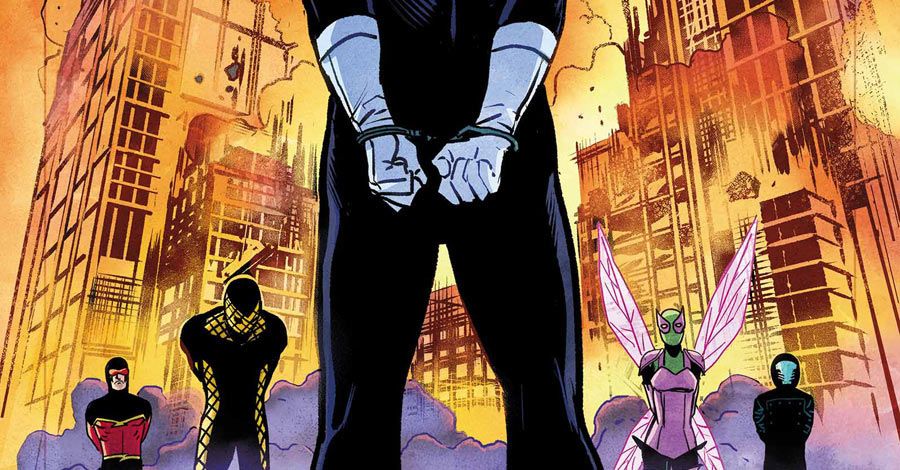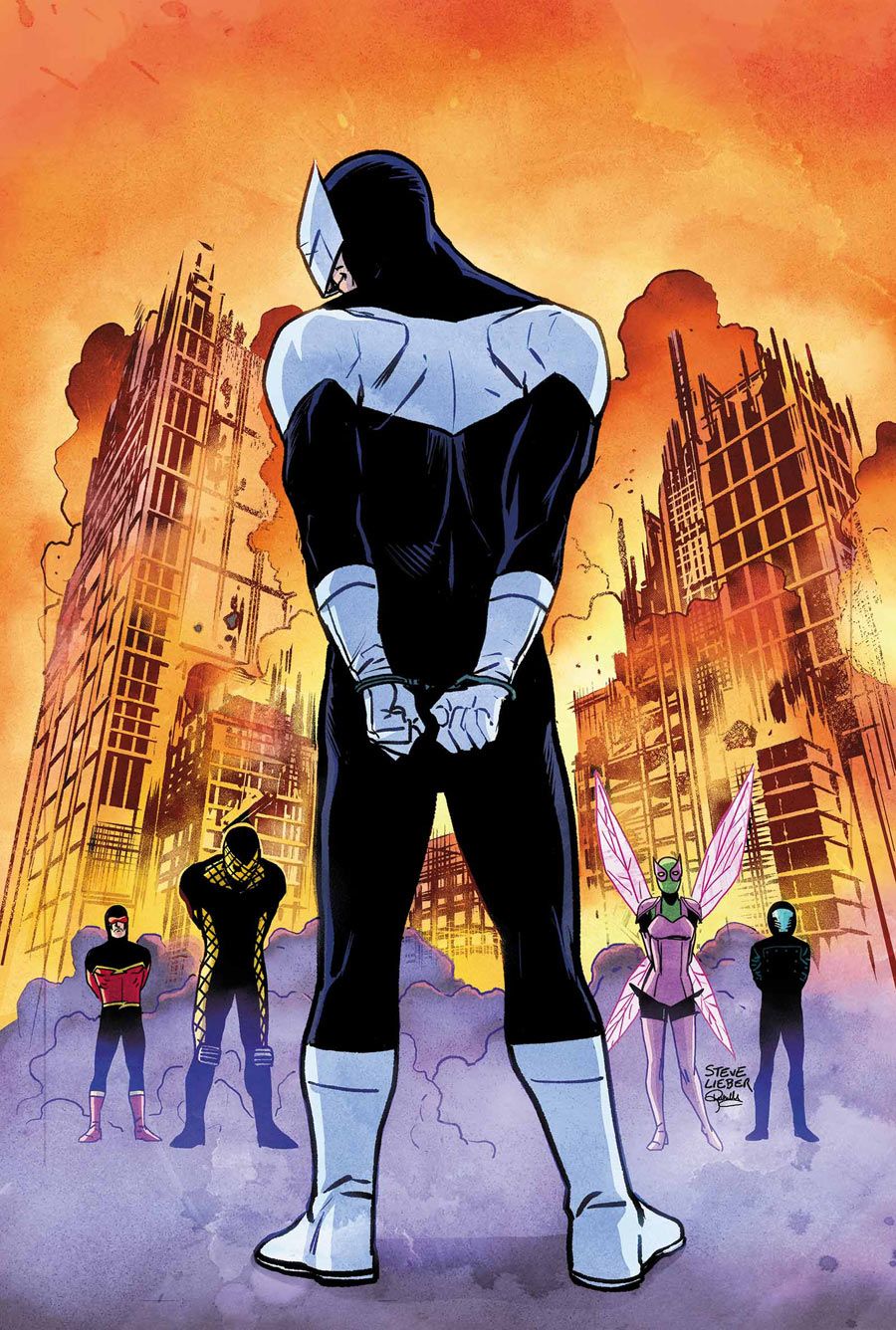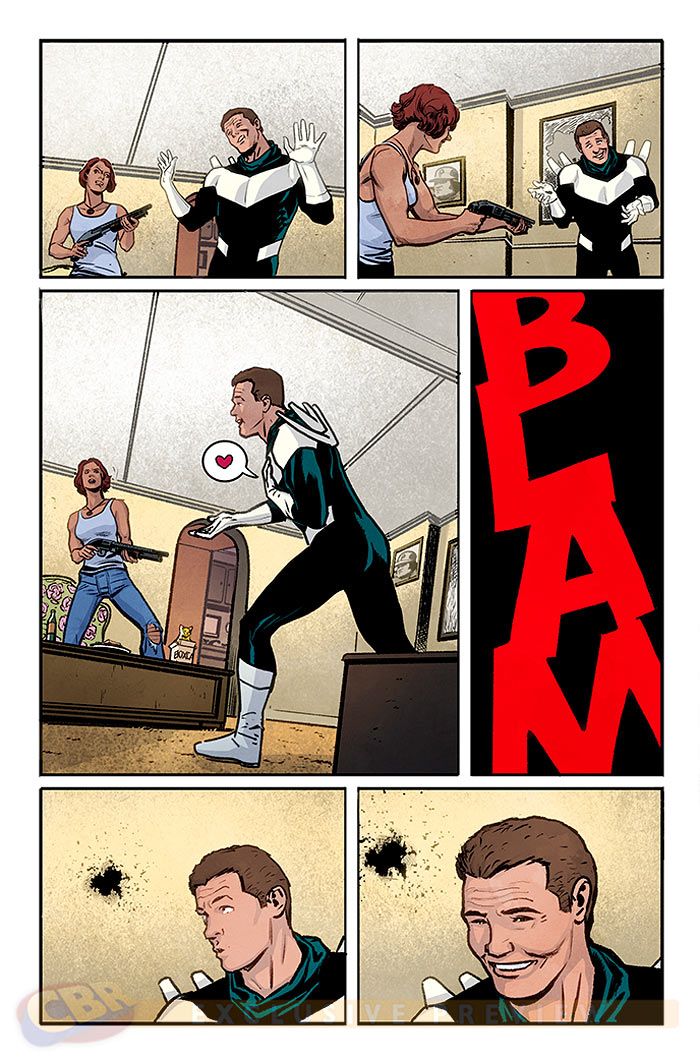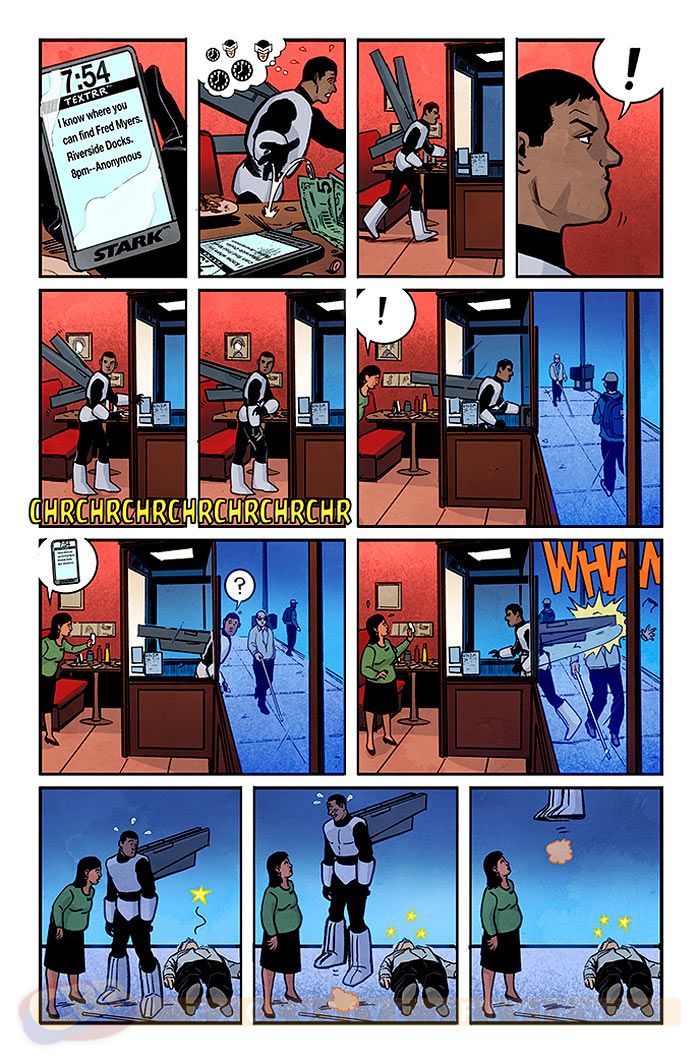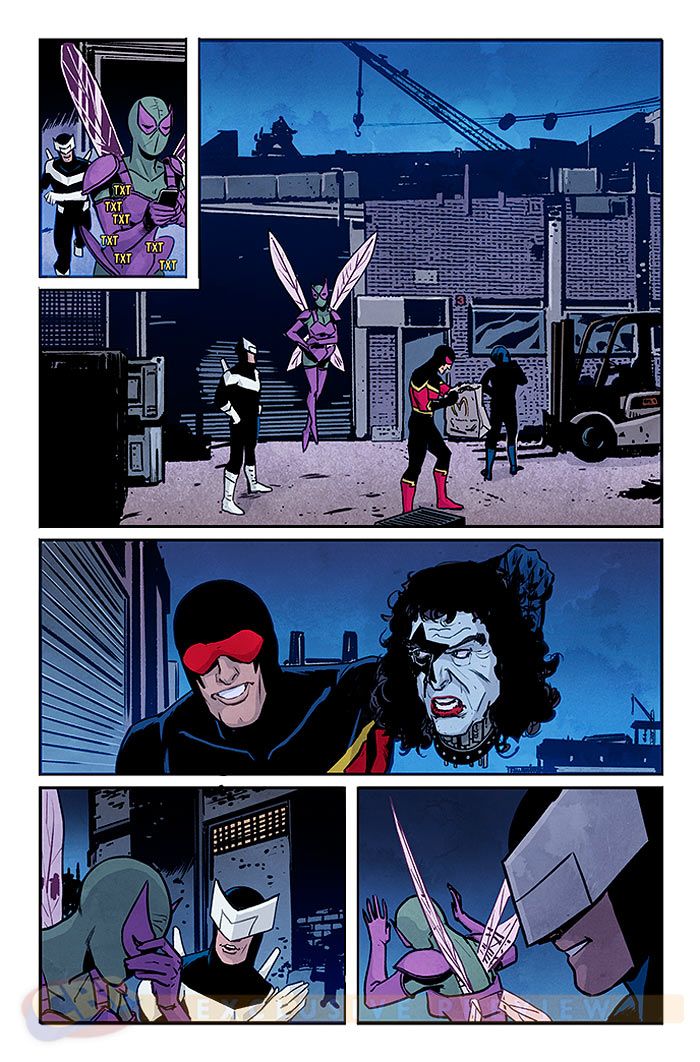The working class never has it easy, but working class supervillains of the Marvel Universe have to deal with a number of especially dangerous and difficult elements, like homicidal competitors, overzealous heroes and the surreal situations that often arise in a world where super powers are a reality. And then there's the fact that in the costumed criminal world, power and cash are more valued than trust and friendship.
RELATED: Spencer's "Uprising" Tilts "Avengers World" on its "AXIS"
No criminal crew knows this better than the cast of Nick Spencer and Steve Lieber's "Superior Foes of Spider-Man." For the past fifteen issues, the series has documented the humorous and harrowing misadventures of Boomerang and his four fellow members of the latest -- and misleadingly named -- incarnation of the Sinister Six: Speed Demon, the Shocker, the Beetle and Overdrive. As the series prepares to come to a close with issue #17, we spoke with Spencer about bidding farewell to the critically acclaimed title, asked for some of his favorite moments from the book and gleaned a few hints about his final plans for the crew.
CBR News: Nick, you have two more issues left of "Superior Foes of Spider-Man" and it looks like you'll be able to give the story a proper ending. Were you able to tell the entire story you wanted to tell with this book?
Nick Spencer: Oh, definitely. When we came on board, we were told that we had 12 issues, so to get 17 means we really had time to do everything we wanted to do. We didn't hurt for pages at all. That is such a rare and rewarding thing in comics -- you don't often get to do the ending you wanted to do. So to get to wrap it all up in the best possible manner was really exciting for me.

All the credit for that goes to Marvel. The book was never a big seller for them, but they stuck with it and kept it around because they knew it had an audience. They knew the people who were reading it were passionate about it, and they felt good about the quality of the work.
Getting that extra time enabled us to do things like the Beetle issue and the Overdrive issue. It gave us some time to spend with those newer characters and the room to really go big with this ending. That's more than I could have hoped for.
Steve Lieber will bring these last two issues to life, after working on almost every issue of the series. How instrumental was Steve in making "Superior Foes of Spider-Man" what it is?
The book would not exist without Steve, and it wouldn't be anything worth reading without him. Steve is one of the best artists I've had the pleasure of working with. He's a storyteller without peer. He's so committed and puts so much work into bringing your script to life and telling an effective story with it.
It's really amazing to watch. I don't know how else to say it. It's how it should be done. I count myself so lucky to have the opportunity to collaborate with him. It's been one of the most rewarding experiences of my career.
Looking back, what did you enjoy most about writing this latest incarnation of the Sinister Six? Were there any members of the team who you especially enjoyed writing?
I've loved writing them all. I think I'm especially proud of Janice Lincoln, the new Beetle, primarily because she was very much a blank slate. We got to create her character almost whole cloth. Plus, the idea of a supervillain story that's also kind of a positive feminist story was this kind of funny contradiction that I'm really proud of. I think it's pretty unique.
I also think she's a pretty neat character. I have really high hopes for her. Like I mentioned when we chatted about "Avengers World," when you do sort of 'birth' these new characters, you're so hopeful for how they'll turn out and that they'll find a place in the Marvel Universe; that other writers will want to use them and that readers will want to see them. I feel as good about that happening with Janice as I ever have with any new character. I really hope that she pops up elsewhere and that she becomes a lasting part of Spidey's rogues gallery. I think she'd be a fantastic addition.
One character whose portrayal I really enjoyed in this series was Shocker. It felt like he's the Charlie Brown of supervillainy.
He is, and this is the only thing about our run that I would say has been mildly controversial. People think that we have played Shocker as a sucker, but that did not come out of left field. This is a very consistent interpretation of the character. If you go back to books like "Deadly Foes of Spider-Man," you see that Herman is not always the bravest guy. It's not that he's always a coward in the purest sense. It's that he's very pragmatic. He just wants to make his money and get out. He's also not a mean guy. He might not have that ruthless instinct that maybe some of the others have. He wants to be a working criminal. He had this idea of how things should be, and he might not understand why the other members of the gang don't see it that way. So this is something that's been reoccurring in Shocker's past.

With all these characters, the reality is they've been frequently dropped into a lot books as kind of fodder, so the interpretations of them have varied pretty wildly. I made sure to do my research, and with all of these characters, their voices sometimes have not been as consistent as you might hope. That was actually a big mission statement for me in this book. By the time we got done with this, these characters would have personalities that would hopefully stick to them, and the next time we see them elsewhere, this is how they would be portrayed. Hopefully that will be the case.
Shocker just keeps coming so close. He always almost has it, and then doesn't. So yeah, he's very much a Charlie Brown story, and Fred is very much the Lucy.
I also wanted to talk a bit about Overdrive, who we recently discovered wanted to break into the world of superheroics by way of supervillainy.
[Laughs] I don't entirely deserve credit for this. Dan Slott had set up Overdrive as a Mister Negative lackey who seemed to be a big fan of Spider-Man, to an almost creepy extent.
I took that little bit of character and tried to build something around that. I thought, "What kind of bad guy has a trunk full of Spider-Man plushies?" Then you realize that half the folks that you immediately think of as core Avengers used to be criminals, and it's very easy to see that the average person who had heard this would think the best way to become an Avenger is to become a criminal first. I just liked the thoroughly ridiculous idea of someone believing that could work; a maybe not all that bright guy like Overdrive coming to the conclusion that being a bad guy for a while is the best way of realizing his dream of becoming a superhero, which will never happen!
Overdrive will never be an Avenger! He'll never be a good guy! I think by writing that story I have doomed him to never realizing that dream.
The book has also featured a number of supporting characters, like the variety of organized crime figures. What was it like creating the organized crime landscape of New York? It felt pretty chaotic, and there was almost a cold war going on between the various factions.
When I was a kid, I played the Marvel Superheroes Roleplaying Game a lot. I loved it. They had this GM screen that had this map of Marvel Manhattan that always stuck out in my head, and with this, I'm realizing a dream I had as a kid. I wanted to take that map and divide it up into territories. So you kind of see that Mister Negative is the Lower East Side-Chinatown guy. Tombstone is up in Harlem. The Owl and Chameleon are in Brooklyn. Everybody has their territory staked out.
In the same way when we were talking about "Avengers World" and each story in the Trouble Map having it's own distinct vibe, I wanted all these different criminal overlords to come from their own kind of movie. Silvermane comes from "The Godfather," whereas Tombstone comes from "American Gangster." You can hear the different music behind all these different characters and see that you're in a very different place. That was kind of fun to work into the book, and Steve did an amazing job of conveying that.
Obviously, these guys are bumping heads for territory, money and power, and the head of Silvermane is such a great thing to stack it all off. The Maggia is sort of the elephant in the room that has a lot of power and resources, but there's a vacuum there, so the head was a pretty easy tool to use to set all of that off.
We've had plenty of organized crime figures and supercriminals, but for a book about supervillains, the hero presence in "Superior Foes of Spider-Man" was not that big. If I remember correctly, it was just Luke Cage, Iron Fist and Mach VII, really. The Punisher seemed to show up, but it was really the Chameleon impersonating him.
Yeah, there hasn't been that many. Those guys get so much page time. Who needs them? It was fun to do a book where we relied on that so little. I think that it would have been maybe a little easy to have it be, "This issue, Daredevil pops up!" and, "This issue, Captain America is here!"
In the last couple of issues ,as the conflict gets bigger, we'll see it definitely attract some other personalities and throw them into the mix. For the most part though, this is a story about working class criminals, and most of the time they're just trying to stay on the right side of the bosses or become bosses themselves. That's really been where we wanted to put the camera.
Looking back, what were some of your favorite funny bits from the series?
I'm particularly proud of the long joke we played with Silvermane's head, just because it got to be both a good gag and a big plot twist. The Doom portrait stuff, as well. I've loved Steve's various uses of Shocker's quilting around his house. A lot of the visual gags, most of them, really, are Steve's ideas, so I get to enjoy those as a fan, like everyone else.
Finally, what can you offer up about these final issues? It looks like things are escalating rather quickly, and a lot of players will be involved.
Definitely. This is a big ending. These unfortunate morons have managed to set off a gang war. [Laughs] That's all going to kick off here in this next issue and carry on through issues #16 and #17.
Will you miss these characters? Is there a chance that the survivors of these last few issues might appear in your future Marvel work?
Yeah, I would love to make sure that these characters stick around, and I can go ahead and say that there's a concrete appearance of one of them in something that I'm writing coming up that I'm really proud of.
Beyond that, I've been really clear online that there's no reboot coming. There's no renaming. We're not doing "Thunderbolts" or "Sinister Six" or anything like that. This is the end of this story. If Marvel called me up and said that they wanted to do issue #18, I would have no idea what to do. This really is the end, and it's fun to get to do an actual, real ending. That's not to say that down the road I wouldn't entertain the idea of a sequel or something like that, but it would be a completely new and different story; this is it for these guys.

